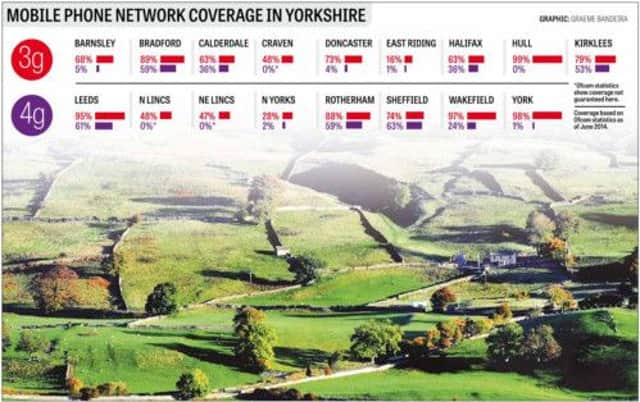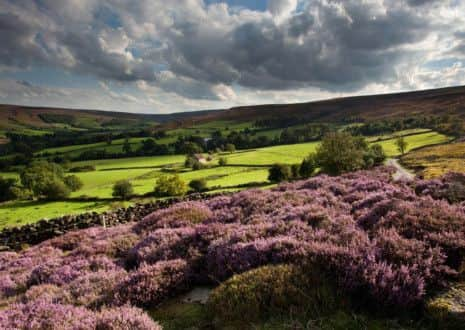Yorkshire loses out as phone signal fails to get through


Across Yorkshire families and businesses are being denied access to the now standard 3G phone signal.
The latest Ofcom figures show that when coverage is measured geographically, some parts of Yorkshire are almost entirely without 3G or 4G reception.
Advertisement
Hide AdAdvertisement
Hide AdThe East Riding area covered by Ofcom shows just 16 per cent get 3G coverage, with only one per cent on the faster 4G network.


Across North Yorkshire coverage is almost as bad. Only around 28 per cent of the county is covered by the 3G signal, with 2 per cent getting 4G. Most Yorkshire cities are at near 100 per cent coverage.
Ofcom said the rural figures rise when counting premises covered, but the lack of a wider rollout threatens to undermine a Government promise to bring an end to rural not spots.
The figures come as it emerges just two phone masts have gone up as part of a £150m infrastructure project first promised in October 2011.
Advertisement
Hide AdAdvertisement
Hide AdWith one mast in Weaverthorpe in North Yorkshire, and one in North Molton, Devon, ministers at the Department of Culture, Media and Sport have pushed back a target of 60,000 new homes covered by the project to 2016.
East Riding MP Sir Greg Knight has raised the coverage issue with the culture minister Ed Vaizey.
Sir Greg said: “I have been assured that the situation is going to improve. The Government is looking at some 600 additional sites for phone masts.
“The Government is also looking at a voluntary version of national roaming to share networks.
Advertisement
Hide AdAdvertisement
Hide Ad“Quite frankly, more has to be done, and things have clearly not moved fast enough.”
Richmondshire District council leader John Blackie said the main mobile phone companies “have no commercial incentive to invest in rural locations”.
The independent councillor added: “We have had it made clear to us as councillors that there is little interest from the commercial sector in reaching the last two per cent of households not covered by national targets.
“The problem with the Mobile Infrastructure Project was that when you looked at what you had to do to get one of those masts brought to you it was beyond the level of organisation that many deeply rural and very small villages can put together.
Advertisement
Hide AdAdvertisement
Hide Ad“The mobile operators won’t invest in us and the public sector sees us through a cost benefit system that does not work in our favour, so we remain deeply cut off in many locations.”
Countryside Alliance head of policy Sarah Lee said: “Bad rural mobile phone signal is the black hole of the digital age and this is unacceptable. Customers pay a premium price for a service they just don’t receive.
“Despite vote-winning promises of improvement from politicians, there has been little or no improvement on the ground.
“We are campaigning hard on this issue and for better broadband in the countryside, which is a central part of our General Election Manifesto, because families and businesses should be able to take a good service for granted and at present that just isn’t the case.”
Advertisement
Hide AdAdvertisement
Hide AdAddressing the issue of rural broadband and phone coverage, culture minister Mr Vaizey said the Government was tackling mobile partial not-spots “through an agreement with mobile network operators that is legally binding and guarantees £5bn commercial investment by 2017”.
He added: “Each operator will cover 90% of the UK’s landmass, halving partial not-spots and cutting complete not-spots by almost two-thirds.”
READ MORE...